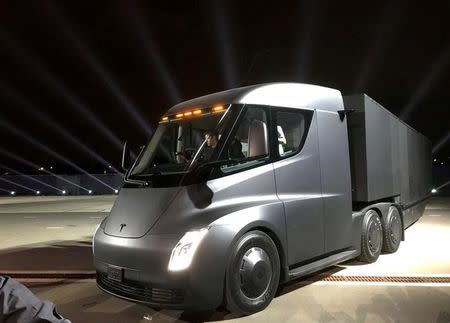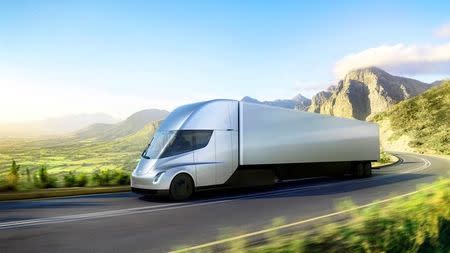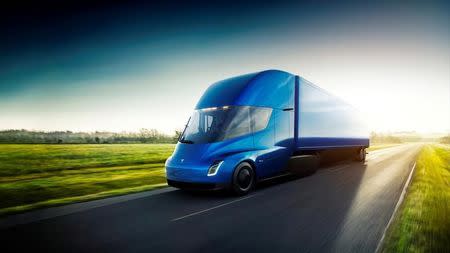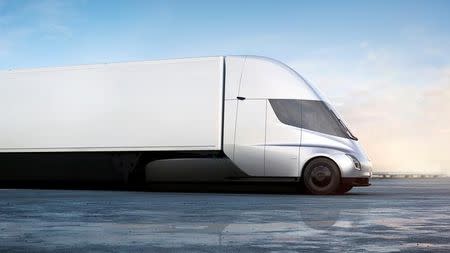J.B. Hunt, Wal-Mart climb aboard Tesla's electric truck
By Arjun Panchadar and Eric M. Johnson
(Reuters) - Tesla Inc <TSLA.O> on Friday got high-profile orders from Wal-Mart Stores Inc <WMT.N> and fleet operator J.B. Hunt <JBHT.O> for its future electric truck, but would-be customers indicated they are giving the big rig a try, not buying in volume.
Most of the customers who announced plans to put down $5,000 deposits for the Tesla Semi indicated they wanted to test a few of the vehicles. Wal-Mart said it plans to order a total of 15 Tesla trucks, five for the United States and ten for Canada. The company operates a fleet of about 6,000 trucks in the United States.
JB Hunt Transport Inc was the first major U.S. trucking company to announce an order for Tesla's new "Semi" electric trucks, saying it had reserved multiple vehicles for use on the U.S. West Coast.
Hunt did not say how many of the vehicles it would reserve. Tesla unveiled the Semi on Thursday without specifying prices.
The early orders reflected the uncertainty about how the market for electric commercial vehicles will develop. About 260,000 Class-8 trucks are produced in North America annually, and that market has a value of about $28.6 billion, said Don Ake, vice president of commercial vehicles at FTR, an industry economics research firm.
The 500-mile (800 km) range between charges that Tesla Chief Executive Elon Musk promised on Thursday for the Tesla Semi is about half the range between fill-ups of a diesel Class 8 truck. Heavy batteries cut payload and add cost, potential deal killers for fleet buyers focused on operating cost per mile.
However, Tesla, and incumbent truck makers such as Daimler AG <DAIGn.DE>, Navistar International Corp <NAV.N> and its partner Volkswagen AG <VOWG_p.DE> are investing in electric trucks in a bet that the market will shift over the next decade.
For global truck makers, the biggest market for electric trucks will likely be China, where the government is moving aggressively to convert the transportation system to electrified vehicles.
Regulators around the world are ratcheting up pressure on the trucking industry to slash emissions of soot and carbon dioxide from diesel trucks. In the United States, the government has estimated that heavy-duty trucks represent 4 percent of vehicles on the road but account for 20 percent of carbon emissions. Under President Barack Obama, the United States required truck makers to boost fuel efficiency through 2027.
Separately, some cities and ports are discussing banning or heavily taxing diesel vehicles. The Ports of Los Angeles and Long Beach in Southern California have a goal of only having zero-emissions trucks by 2035. California is committing $140 million to subsidize low-carbon freight transportation.
Tesla has been trying to convince the trucking community that it can build an affordable electric big rig with the range and capacity to compete with relatively low-cost, time-tested diesel trucks.
It was not clear how many orders for Semis Tesla had in hand. Among companies announcing plans to acquire small numbers of Tesla trucks were Michigan retailer Meijer Inc [MEIJR.UL] and Canadian retail chain Loblaw <L.TO>, which has said it wants an entirely electric corporate vehicle fleet by 2030.
Some big logistics companies stayed on the sidelines. United Parcel Service Inc <UPS.N> said the courier had nothing to announce regarding Tesla's vehicles but would always look for options that fit its needs.
Brad Pinchuk, chief executive of Dubuque, Iowa-based Hirschbach Motor Lines, said his firm was looking to test non-diesel big-rig options but needed longer ranges than Tesla could provide and speedier fuel-up times.
Pinchuk said he plans to buy two hydrogen-powered trucks made by Salt Lake City-based electric Nikola Motor Company when they are available in 2020.
"It’s a different application – putting liquid hydrogen into tanks – so it will be very similar sort of situation to diesel," Pinchuk said. "You’d be able to fuel up. It would take about the same amount of time to fuel up a diesel and go about the same distance."
(Reporting by Sonam Rai and Arjun Panchadar in Bengaluru, Nandita Bose in Chicago; Editing by Anil D'Silva and Nick Zieminski)




